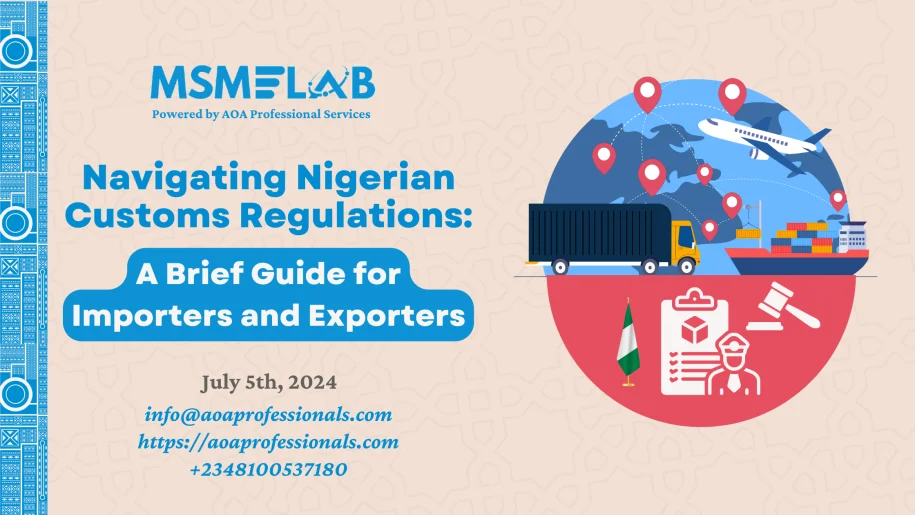Introduction
Navigating the complexities of Nigerian customs regulations can be challenging for importers and exporters. This guide aims to provide a comprehensive overview of the essential regulations, procedures, and case studies to illustrate practical applications.
Key Regulations and Laws
Nigeria Customs Service Act 2023
Overview: Nigeria Customs Service Act, 2023 governs the operations of the Nigeria Customs Service (NCS), detailing procedures for importation, exportation, and the duties applicable.
Key Provisions:
– Import Duties: Rates vary depending on the type of goods.
– Export Duties: Usually applied to non-oil exports.
– Prohibited Items: Certain items are prohibited from import/export, such as narcotics and counterfeit goods.
Import Guidelines, Procedures, and Documentation Requirements
- Pre-Arrival Assessment Report (PAAR): Required for all imports, issued by the NCS to facilitate risk assessment.
- Form M: An import declaration form that must be completed and approved before goods are shipped.
- Bill of Lading/Airway Bill: Essential transport documents for sea and air shipments respectively.
- Packing List and Commercial Invoice: Provide details of the cargo and its value.
- Certificate of Origin: Establishes the country of origin of the goods.
Export Documentation Requirements
- Nigeria Export Proceeds (NXP) Form: Must be completed for all exports, tracking foreign exchange inflows.
- Quality Certification: Issued by relevant agencies like the Standards Organisation of Nigeria (SON) for certain goods.
Prohibited and Restricted Goods
- Prohibited Imports: Includes items like firearms, counterfeit currency, and certain pharmaceuticals.
- Restricted Imports: Items that require specific permits or licenses, such as wildlife products and hazardous materials.
Customs Procedures
Import Process
- Pre-Importation: Secure PAAR, complete Form M, and ensure all necessary documents are in place.
- Arrival of Goods: Present the Bill of Lading/Airway Bill, Commercial Invoice, Packing List, and Certificate of Origin.
- Customs Clearance: Goods are inspected, duties and taxes are assessed and paid.
- Delivery: Upon clearance, goods are released for delivery.
Export Process
- Pre-Exportation: Complete the NXP Form and secure quality certifications.
- Loading and Shipment: Ensure the Bill of Lading/Airway Bill, Commercial Invoice, and Packing List are prepared.
- Customs Clearance: Goods are inspected, and the necessary duties and taxes are assessed and paid.
- Post-Export Documentation: Maintain records of export documentation for compliance and audit purposes.
Case Studies
Case Study 1: Successful Importation of Machinery
Company: ABC Manufacturing Ltd.
Scenario: Importing industrial machinery from Germany.
Process:
– Secured PAAR and completed Form M.
– Shipped machinery with all required documentation.
– Customs inspection identified discrepancies in the packing list.
– Resolved discrepancies, paid applicable duties, and cleared goods successfully.
Outcome: Machinery was installed without delays, demonstrating the importance of accurate documentation.
Case Study 2: Export of Agricultural Produce
Company: Green Farms Ltd.
Scenario: Exporting cocoa beans to Europe.
Process:
– Completed NXP Form and obtained quality certification from SON.
– Shipped cocoa beans with all required documentation.
– Customs inspection verified compliance, and export duties were assessed and paid.
– Goods were cleared for export and shipped to the European buyer.
Outcome: Successful transaction enhanced the company’s reputation, highlighting the importance of compliance with export regulations.
Case Study 3: Handling Restricted Imports
Company: XYZ Chemicals Ltd.
Scenario: Importing restricted chemicals for industrial use.
Process:
– Obtained necessary permits and licenses for the restricted chemicals.
– Secured PAAR and completed Form M.
– Shipped chemicals with all required documentation.
– Customs inspection verified permits and cleared goods.
Outcome: Ensured compliance with regulations, avoiding penalties and delays.
Conclusion
Navigating Nigerian customs regulations requires thorough preparation, accurate documentation, and compliance with legal requirements. Importers and exporters must stay updated with regulatory changes to ensure smooth operations. Understanding the processes and learning from case studies can significantly improve efficiency and reduce the risk of non-compliance.


2 Comments
Snipfeed
I am extremely impressed with your writing skills as well as with the format
for your blog. Is that this a paid topic or did you modify it
yourself? Either way stay up the nice high quality writing, it is rare to look a great
weblog like this one nowadays. Youtube Algorithm!
Rebecca Sunday Ufot-Ayoola
Thank you for your kind words and for visiting our website. We’re glad you enjoyed reading this blog post.